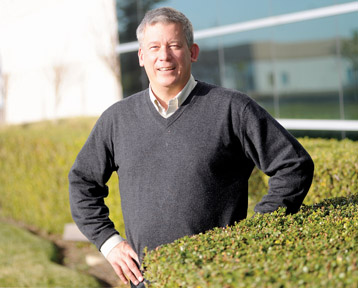
County’s Rob Bernosky hopes second time is a charm
County’s Rob Bernosky hopes second time is a charm
Despite having been outspent nearly 4-to-1 and now having to face an incumbent that defeated him by 22 percentage points in the 2010 election, Hollister Republican Rob Bernosky is hoping a pro-education, lower regulation message will resonate with voters in the redrawn 30th Assembly District during the fall election.
“Things have got worse in the state since I ran, not better,” he said. “It makes a difference because (Democrat Luis Alejo) has a horrible track record. He has made a lot of votes and authored a lot of bills that have nothing to do with what people are most concerned about.”
Alejo, then-mayor of Watsonville, defeated Bernosky 61 percent to 39 percent two years ago to win the 28th Assembly seat in a Democratic-leaning district, which since the last cycle has dropped San Jose, now includes Morgan Hill, and is changing from the 28th to the 30th district after districts were redrawn as a result of the 2010 Census.
“People are worried about when they’re going to get back to work and they’re worried about the quality of education their children are getting,” said Bernosky, a chief financial officer of a local company and a former board member of the North County Joint Union School District – where his wife, Jenny, is principal. “Mr. Alejo has voted for bills that divert resources from the core curriculum.”
Bernosky said California needs to spur investment in the state in order to encourage job creation.
“The way you do that is by decreasing regulations and making California a more business-friendly state,” he said. “California has to compete with other states and other countries. In the past year, we’ve added more burdens to businesses instead of taking them away. There is so much uncertainty about future regulations that businesses naturally contract. Until we fix that, more businesses will leave the state.”
While he acknowledges that running against an incumbent “is typically against conventional wisdom,” Bernosky said he believes his opponent’s “dismal” record affords a chance for “a CFO with a track record.”
With an open primary meaning voters of any party can vote for the candidate of their choice, Bernosky said he plans to highlight Alejo’s voting record and address “what is most important to people,” including job creation, education and long-term pension reform.
Bernosky’s campaign plans to highlight how in 2010 he raised only $30,000 and still received nearly 40 percent of the vote, while Alejo spent more than $415,000.
“My message resonates with the voters; his does not,” Bernosky said. “He was pretty connected before. That’s what’s broken about California. You have a shadow government of union-based money. But even union members’ kids are sitting in classrooms with 38 or 40 kids. If there is no job creation, there is no need for unions to be there.”
Addressing lessons he learned from his previous campaign for Assembly, Bernosky said he hopes to raise more money to help get his message out to more people and he wants to debate Alejo.
“In the last election, he did not debate me,” Bernosky said. “If he doesn’t debate me, we’re going to be yelling that loud and clear because we have to talk about the real issues. I don’t know too many people that are happy with the education system or being unemployed or underemployed. I don’t know too many people that are happy about their home values being so under water and nobody is doing anything about it.”
Bernosky said he will send mailers to voters this year – a strategy he was not able to employ in 2010 – and he will do more precinct walking.
With one daughter as a sophomore at UCLA, another a senior at San Benito High School and an eighth-grade son at Spring Grove Elementary, Bernosky said improving education is a staple of his platform.
“In the past quarter century, we have dumped a lot of money into education but we are graduating kids from college that do not have relevant majors,” he said. “I have a daughter in the U.C. system and we’ve had three tuition increases since she’s been there. The university system has become too bloated with non-relevant majors and administrators that have to merit that. Where is the legislature on this? They should be reigning in the spending and making sure students are thriving in college.”
He said he is also a proponent of restoring vocational training in high school for students who don’t plan to go to college, giving them “skills that are needed in the marketplace.”







